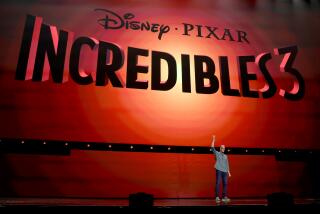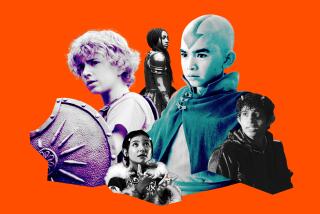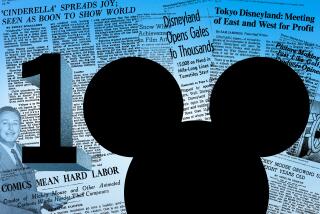Studios Find There’s No Place Like Home
- Share via
Direct-to-video is commonly associated with genre films and B-movies that range from Don “The Dragon” Wilson martial arts kickfests to Shannon Tweed erotic thrillers.
Enter Robin Williams, the featured attraction in “Aladdin and the King of Thieves.” Disney’s second “Aladdin” sequel premieres Tuesday not in theaters, but in your living room.
“King of Thieves” boasts marketing muscle and marquee star power unprecedented for direct-to-video. Disney is launching this title with, well, theatrical fanfare. A more than $70-million marketing campaign includes promotions with such partners as McDonald’s. Instead of sending out advance copies of the video to retailers and the press, Disney previewed the film in theaters.
Billboards for “King of Thieves” make no mention of venue. They simply proclaim, “He’s back”; he, of course, being Williams.
So why no theatrical release for the sequel to one of Disney’s most successful animated features starring one of Hollywood’s most bankable stars?
*
Because, as the song says, it’s a whole new world. From MCA/Universal Home Video’s “Land Before Time” series to FoxVideo’s recently announced plans for a live-action “Casper” prequel, Disney and other studios are joining the fledgling market of first-run programming produced for the sell-through market.
“The Return of Jafar,” Disney’s first major foray into the produced-for-video market helped to break the B-movie stigma attached to films that did not receive theatrical distribution. It sold an estimated 12 million copies, ranking it among the top 20 best-selling videos of all time, signaling to Disney and the industry that consumers would respond to a film receiving its first run on video.
“When we first explored this business, it made sense to do a sequel to a movie that had built-in awareness,” said Tania Moloney, Buena Vista Home Video vice president of publicity and marketing. “Our feature film animation group is interested in breaking new ground and pushing the envelope to come up with new animation techniques. A sequel would not be of interest to them anyway, but there is a demand to continue these stories.”
Though Williams joked to retailers at the Video Software Dealers Assn. convention held last month in Los Angeles that normally, if one’s movie goes direct to video, “your career’s over,” he said in an interview that he had no trepidation about participating in “King of Thieves.”
“I loved doing the first one,” he said. “Those were some of the best reviews I ever got.” Adopting the mannered voice of a critic, he said with a nod, “We like it better when we can’t see you.”
*
In “King of Thieves,” the long-awaited royal wedding between Aladdin and Princess Jasmine is delayed when Aladdin sets out in search of his long-lost father, leading him to the den of the notorious Forty Thieves.
In addition to original voice cast members Scott Weinger as Aladdin, Linda Larkin as Jasmine and Gilbert Gottfried as the opportunistic parrot Iago, the film also features Jerry Orbach as the menacing Sa’luk and John Rhys-Davies as Cassim, the King of Thieves.
But Williams is the franchise player. His Genie combines the best of both worlds: Disney animation and the anarchic spirit of a Chuck Jones’ Warner Bros. cartoon.
The character presented Williams with a rare opportunity to just “kick out the jams and push yourself as far as you can and explore every comedic possibility,” he said.
“I know there are boundaries because of the children. We can’t all of a sudden go, ‘Rub the lamp, harder, harder.’ But I’ll push [Disney] in other ways they may not want to go.”
As in the original “Aladdin,” Williams channels through Genie a pell-mell rush of TV and movie references that span Ozzie Nelson to Williams’ own Mrs. Doubtfire. There are also several in-jokes at Disney’s expense. A nostalgic gag that opens the film recalls the long-running Disney TV series “The Wonderful World of Color.” Later, Genie morphs into Pumba from “The Lion King” and even Pocahontas. In another manic riff, he becomes a Disney marketing department flack pitching new Aladdin merchandise.
“It’s the one time [animators] can legally mess with Disney and not have some executive say, ‘What the hell are you doing? Don’t you understand? The mouse, the mouse is everything!’ ” Williams said.
The irony with that bit, of course, is that Williams sat out the “Jafar” video because of his much-publicized clash over Disney’s use of Williams’ voice to sell “Aladdin” merchandise.
*
It was Disney’s fondest wish that Williams would again reprise the Genie, since he helped to make the original “Aladdin” a nearly $220-million box-office sensation that subsequently sold 24 million copies on video. Disney Chairman Joe Roth issued an apology and Williams signed on, for somewhat more than the $75,000--and the gift of a Picasso--he received for the original.
Williams, retailers say, is the main attraction. “We’re playing [the title] up significantly,” said Peter Busch, vice president divisional merchandise manager for the Musicland Group, which includes the Suncoast Motion Picture Co. and Sam Goody chains. “ ‘Aladdin’ is a strong franchise with a proven track record. We did very well with ‘Jafar,’ but ‘King of Thieves’ will harken back to the original in terms of significance because of Williams. Kids will want it because it’s ‘Aladdin’ and adults will want it because of him.”
As an illustration of the studio’s commitment to the market, Walt Disney Animation Canada Inc. earlier this year opened a studio primarily dedicated to producing direct-to-video programs in connection with Walt Disney Television Animation, the creators of “King of Thieves,” “Jafar” and “A Goofy Movie.”
Disney’s emphasis for now is on revitalizing popular characters. Next year will see the release of the live-action “Honey, We Shrunk Ourselves,” starring Rick Moranis, and “Simba’s Pride,” a sequel to “The Lion King.” In various stages of development are a “Beauty and the Beast” story called “Christmas Belle” and a first-ever “Winnie the Pooh” feature (the March release ‘The Many Adventures of Winnie the Pooh” comprised three previously released featurettes).
Disney is not alone. MCA/Universal Home Video is aggressively developing produced-for-video programs as an opportunity to extend the life of popular films and offer filmmakers a new distribution channel to reach audiences.
“The home video business is a $16-billion industry,” said Craig Relyea, MCA/Universal vice president of marketing, “so it’s certainly viable enough to sustain programming that was developed specifically for the medium. The greatest initial opportunity lies in extending theatrical properties with solid characters that are popular with audiences.”
The studio’s first major entree into this market was “The Land Before Time II,” which was released in December 1994. The fourth in the series will be released this December. The franchise, Relyea said, has generated $300 million, a figure that includes video sales and merchandising tie-ins. Another that could see further development is “An American Tail.”
MCA/Universal is also branching out beyond family fare. The company has released to the rental market sequels to the cult favorite “Tremors,” co-starring original cast members Fred Ward and Michael Gross, and “Darkman,” with the third, starring Jeff Fahey, scheduled to be released Aug. 20.
Sam Raimi, who directed the original, was not available for comment, but in “A Letter to the Video Industry” that appeared in trade publications last year, he co-wrote, “It seemed ideal to produce a follow-up geared for the market that expressed such ongoing enthusiasm for the Darkman character.”
The burgeoning produced-for-video market offers benefits for studios and retailers, noted Bob DeLellis, president of 20th Century Fox Home Entertainment. “It is a way for a home video company to expand its library and it also gives exclusivity to the retailer and gives them the showcase of the premiere.”
But, he added, FoxVideo is taking a measured approach. Its “Casper” prequel, produced in association with Saban, is in the script stage with a release date most likely at the end of 1997. “We believe in the concept but we also believe it has to be done very carefully,” he said. “There has to be some kind of a franchise behind it. We’re not going to release six or seven of these a year. It doesn’t work that way.”
* OUT OF THE LAMP: Robin Williams is back as the voice of Aladdin’s Genie. F20.
More to Read
The biggest entertainment stories
Get our big stories about Hollywood, film, television, music, arts, culture and more right in your inbox as soon as they publish.
You may occasionally receive promotional content from the Los Angeles Times.









